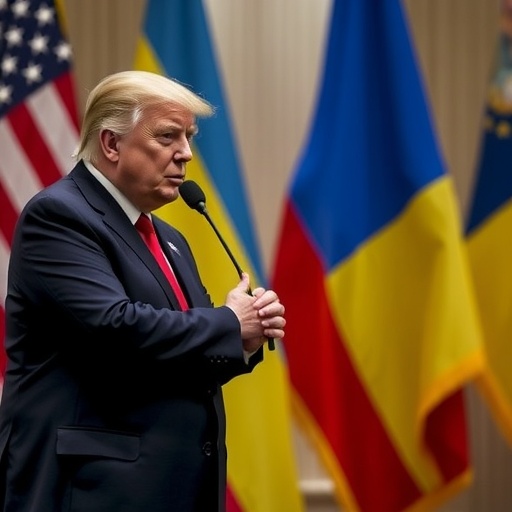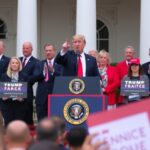Trump‘s Controversial Peace Proposal Ignites Global Outrage
In a bombshell statement that has sent shockwaves through international diplomacy, President Donald Trump declared that Ukraine should relinquish control of the Donbas region to Russia as a prerequisite for ending the protracted war. Delivered during a high-profile interview on Fox News, Trump‘s remarks represent a dramatic pivot from longstanding U.S. policy, which has staunchly supported Ukraine’s territorial integrity since Russia’s full-scale invasion in 2022. “It’s time for Ukraine to make the tough call—give up Donbas, and we can have peace with Russia tomorrow,” Trump asserted, emphasizing that such a concession could pave the way for broader peace talks.
The timing of Trump’s comments could not be more charged, coinciding with accelerating preparations for a landmark US-Russia summit scheduled in Budapest, Hungary. Sources close to the White House indicate that preliminary agendas are being drafted, focusing on de-escalation strategies amid the ongoing conflict that has claimed over 500,000 lives, according to United Nations estimates. Trump’s intervention has thrust the issue of territorial compromise into the spotlight, challenging allies and adversaries alike to reconsider their stances in what could be a turning point for Eastern European security.
Historically, the U.S. has provided Ukraine with more than $60 billion in military and humanitarian aid under both Trump and Biden administrations, underscoring a bipartisan commitment to Kyiv’s sovereignty. Yet, Trump’s latest rhetoric echoes his campaign promises of swift resolutions to global conflicts, prioritizing American interests over prolonged engagements. Critics, including Democratic leaders, have lambasted the proposal as a betrayal of democratic values, while supporters hail it as pragmatic realism in a war-weary world.
Zelensky’s Defiant Stand Against Conceding Donbas
Ukrainian President Volodymyr Zelensky wasted no time in rebuking Trump’s suggestion, labeling it “unacceptable and dangerous” in a fiery address to the Ukrainian parliament. “Donbas is Ukrainian soil, soaked in the blood of our heroes. We will not trade our land for empty promises of peace with Russia,” Zelensky proclaimed, rallying national pride and underscoring the region’s symbolic importance to Ukraine’s identity. The Donbas, comprising the Luhansk and Donetsk oblasts, has been a flashpoint since 2014, when pro-Russian separatists, backed by Moscow, seized control amid the Euromaidan Revolution’s aftermath.
Zelensky’s rejection aligns with Kyiv’s unwavering position in peace talks, where any territorial concessions are viewed as capitulation to aggression. In recent negotiations mediated by Turkey and Qatar, Ukraine has insisted on full Russian withdrawal from all occupied territories, including Crimea, annexed in 2014. Trump’s comments, Zelensky argued, undermine these efforts and embolden Russian President Vladimir Putin, who has repeatedly demanded recognition of annexed regions as a condition for ceasefire.
Domestically, Zelensky’s stance resonates deeply; polls from the Kyiv International Institute of Sociology show over 80% of Ukrainians oppose ceding territory, even for peace. This public sentiment has bolstered Ukraine’s resilience, enabling it to reclaim swathes of land in counteroffensives like the 2022 Kharkiv operation. However, war fatigue is mounting, with economic losses exceeding $400 billion and millions displaced, prompting whispers of compromise within some Ukrainian circles—though not at the expense of Donbas.
Inside the Buzz: US-Russia Summit Preparations in Budapest
As Trump’s provocative words echo, the diplomatic machinery is humming with activity for the upcoming US-Russia summit in Budapest. Set for mid-November, the gathering—hosted by Hungary’s neutral government—aims to revive stalled peace talks amid escalating tensions. Hungarian Prime Minister Viktor Orban, a vocal critic of EU sanctions on Russia, has positioned Budapest as an ideal venue, citing its historical role in Cold War-era dialogues.
Preparations involve high-level delegations from both sides, with U.S. Secretary of State Antony Blinken reportedly leading American efforts. Agenda items include arms control, energy security, and pathways to de-escalate the Ukraine conflict. Insiders reveal that Russia’s demands for lifting Western sanctions and acknowledging territorial gains, particularly in Donbas, will clash head-on with U.S. insistence on humanitarian corridors and prisoner exchanges.
The summit carries high stakes: success could unlock frozen assets worth $300 billion held by Russia and facilitate grain exports crucial to global food stability, as Ukraine’s Black Sea ports remain blockaded. Failure, however, risks further isolation for Moscow and strained NATO unity, especially with Hungary’s pro-Russia leanings. Trump’s influence looms large; his direct line to Putin, forged during their 2018 Helsinki summit, could inject unpredictability into proceedings.
Logistically, Budapest’s security apparatus is on high alert, with Interpol coordinating against potential disruptions from pro-Ukraine activists. This event marks the first major US-Russia dialogue since the 2022 invasion, underscoring a fragile thaw in relations frozen by mutual distrust.
Donbas: The Beating Heart of Ukraine’s Struggle Against Russia
The Donbas region’s plight lies at the epicenter of the Ukraine-Russia war, a industrial heartland rich in coal and steel that has endured over a decade of conflict. Since 2014, when Russian-backed separatists declared independence in Donetsk and Luhansk, the area has seen relentless fighting, displacing 1.5 million residents and destroying infrastructure valued at $15 billion. Russia’s 2022 invasion intensified the crisis, with Moscow claiming the territories as annexed republics, a move unrecognized internationally.
Economically, Donbas once contributed 15% to Ukraine’s GDP through mining and manufacturing. Today, it’s a war zone scarred by artillery barrages and minefields, where civilians face daily perils. Reports from Human Rights Watch document widespread atrocities, including summary executions and forced conscription into separatist forces, highlighting the human cost of the impasse.
Trump’s proposal to cede Donbas revives painful memories of the 2015 Minsk Agreements, which promised autonomy but delivered only sporadic ceasefires. Ukrainian forces, bolstered by Western Javelins and HIMARS systems, have defended key cities like Bakhmut at enormous cost—over 20,000 troops lost in that battle alone. Russia’s strategy, involving Wagner mercenaries and conscript waves, aims to grind down resistance, but Ukrainian ingenuity, like drone warfare innovations, has turned the tide in pockets.
Geopolitically, Donbas symbolizes Russia’s revanchist ambitions, echoing Soviet-era control. For Ukraine, holding it affirms sovereignty; losing it could domino into further encroachments, threatening NATO’s eastern flank.
World Leaders React to Trump’s Ukraine Stance and Peace Talks Outlook
Trump’s call for Ukraine to yield Donbas has elicited a torrent of reactions from global leaders, fracturing alliances and amplifying calls for urgent peace talks. European Union foreign policy chief Josep Borrell decried the idea as “short-sighted,” warning it would reward aggression and destabilize the continent. “We stand with Ukraine’s right to its borders,” Borrell stated, pledging an additional €5 billion in aid.
In contrast, voices from the Global South, like Indian Prime Minister Narendra Modi, have urged dialogue without preconditions, reflecting a desire to mediate amid economic ripple effects—Russia’s war has driven up global energy prices by 30%, hitting developing nations hardest. Chinese President Xi Jinping, maintaining neutrality, echoed Trump’s pragmatism in a Weibo post, suggesting territorial adjustments could foster stability.
Within the U.S., bipartisan backlash is swift: Senate Majority Leader Chuck Schumer called Trump’s words “a gift to Putin,” while Republican hawks like Senator Lindsey Graham emphasized unyielding support for Kyiv. Public opinion is divided; a recent Pew Research poll shows 55% of Americans favor negotiations, up from 40% in 2022, amid inflation concerns tied to the conflict.
Looking ahead, the Budapest summit could redefine peace talks trajectories. If Trump brokers a deal, it might expedite ceasefires and reconstruction, potentially unlocking $100 billion in international funding for Ukraine. Yet, Zelensky’s resolve and Russia’s intransigence suggest protracted haggling. Analysts predict hybrid outcomes—partial truces in Donbas alongside broader sanctions relief—setting the stage for a new cold war equilibrium or, optimistically, lasting reconciliation between Ukraine, Russia, and the West.








